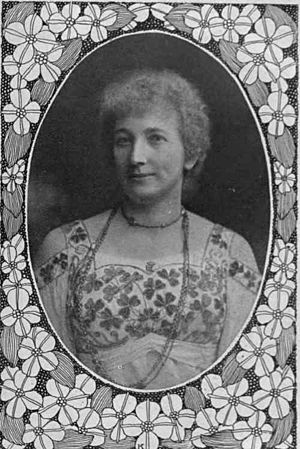Alicia Adélaide Needham facts for kids
Quick facts for kids
Alicia Adélaide Needham
|
|
|---|---|
 |
|
| Born |
Alicia Adélaide Montgomery
31 October 1863 Oldcastle, County Meath, Ireland
|
| Died | 24 December 1945 (aged 82) |
| Nationality | Irish |
| Alma mater | Royal Academy of Music, London Royal College of Music |
| Occupation | Composer, Suffragette |
| Spouse(s) |
Joseph Needham
(m. 1892; |
| Children | Joseph Needham |
Alicia Adélaide Needham (born Montgomery; October 31, 1863 – December 24, 1945) was a talented Irish composer. She wrote many popular songs and ballads. Alicia was also a strong supporter of women's rights, known as a Suffragette. She made history as the first woman to conduct music at the famous Royal Albert Hall in London. In 1906, she became the first female president of the National Eisteddfod of Wales, a big cultural festival.
Contents
Life of a Composer
Early Life and Education
Alicia Needham was born in Oldcastle, Ireland. Her maiden name was Montgomery. She attended boarding school in Derry for four years. After that, she spent a year in Castletown, Isle of Man.
Alicia loved music and studied at the Royal Academy of Music in London. She learned piano from Arthur O'Leary. She also studied harmony and counterpoint, which are important parts of music theory. She graduated in 1887. In 1893, she also passed exams for the Royal College of Music. In 1892, she married Joseph Needham, a doctor from London. Their only child, also named Joseph, was born in 1900.
A Prolific Composer
Alicia's husband, Joseph, strongly supported her music career. He helped her organize concerts and publish her first works. Her musical journey began in 1894. She gave piano and song recitals, sharing her music with others.
Alicia was a very busy composer. She wrote about 700 pieces of music! Most of these were songs. But she also wrote duets, trios, and quartets for voices and piano. She composed some piano music and even hymns for choirs. She also wrote marches for brass bands. More than 200 of her published works are kept in the British Library. Some of these are song cycles, which are collections of songs.
Achievements and Recognition
Alicia Needham was a very important figure in her time. She was part of the Pan-Celtic movement. This group celebrated Celtic culture from 1899 to about 1910. In 1904, she attended the Pan-Celtic Congress in Caernarfon.
In 1906, Alicia became the first woman President of the National Eisteddfod of Wales. This was a huge honor. Other presidents that year included important figures like the Lord Mayor of London. A few years later, she was named a "Bardess of Wales." This meant she was a member of the Welsh Gorsedd of the Bards. Her special title was "Harp of Ireland."
Alicia also achieved another first: she was the first woman to conduct music at the famous Royal Albert Hall. In 1910, she was a special guest at a banquet in Dublin. This event honored 'Irish Women of Letters'.
One of her biggest successes was winning a competition in 1902. She wrote the Prize Song for the coronation of King Edward VII. Over 300 composers entered the contest. Alicia won the £100 prize for her song. She wrote it quickly while staying at the Shelbourne Hotel in Dublin.
Later Years
Alicia Needham's life changed a lot after her husband passed away in 1920. She had to sell her house and many belongings. She moved into a smaller apartment. She wrote in her autobiography about how she had to sell her "best things and treasures."
After 1920, she seemed to stop composing new music. Her letters and diaries also ended around this time. She faced some financial and health challenges later in life. Alicia passed away quietly on Christmas Eve in 1945 in London.
Her son, Joseph Needham, became a famous scientist. Because of his fame, his mother's papers and belongings were saved. These include her published music, letters, diaries, and photographs. These items help us learn more about Alicia's life and work.
Her Music
Selected Works
- An Album of Hush Songs (1897)
- The Seventh English Edward (1902)
- A Bunch of Shamrocks: Irish Song Cycle for Four Solo Voices (1904)
- Twelve Small Songs for Small People (1904)
- Four Songs for Women Suffragists (1908)
- A Bunch of Heather: Scottish Song Cycle (1910)
- Army and Navy Songcycle (1912)
More Information
Links
- Alicia Adélaide Needham: Free scores at the International Music Score Library Project
See Also
 In Spanish: Alicia Adélaide Needham para niños
In Spanish: Alicia Adélaide Needham para niños
 | Aurelia Browder |
 | Nannie Helen Burroughs |
 | Michelle Alexander |

